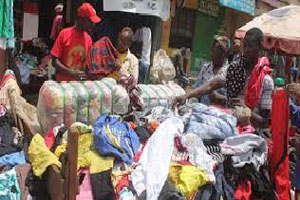
African countries to ban imported secondhand clothes from UK, US
YarnsandFibers News Bureau 2018-03-01 10:00:00 – AfricaThe African countries to enhance textile manufacturing sector that presently contributes 8.7 percent to the regional Gross Domestic Product to 25 percent by 2032. In March 2016, the head of states in the East African Community (EAC), which comprises of Uganda, Kenya, Tanzania, Rwanda, Burundi and South Sudan, had agreed to ban import of used clothes from the US and UK into the region in three years as part of the EAC Vision 2050 and the Industrialization Policy. The countries are hoping that local factories will create much-needed jobs and increase exports.
The three African countries – Rwanda, Tanzania and Uganda have strongly agreed to ban second-hand clothing, mostly imported from the US and UK, in order to support their own textile industries.
But the US has claimed that the proposed ban goes too far and violates the free trade agreements under the African Growth and Opportunity Act (AGOA), which aims to expand trade and investment on the continent.
At a summit last Friday in Uganda’s capital Kampala, leaders agreed on a compromise in response to the pressure from Washington. According to them, second-hand imports will not be directly banned, but import taxes will still need to be paid.In addition, they want to invest more money in their own textile industry.
In the meeting’s closing communiqué, they said that the members of the East African Community should promote their textile industry by using measures which do not jeopardize the benefits of AGOA membership.
According to Rodgers Mukwaya from the UN Economic Commission for Africa (UNECA), it is still unclear whether the US intends to go along with its threats. But even if the EAC is excluded from the AGOA by the US, it probably won’t pose much of a risk.
The AGOA has not had a strong benefit for countries in Eastern Africa. So any ban from the US will not have a big effect on the exports from Eastern Africa with the exception of Kenya.
Market Intelligence
Ask for free sample Report

experience
Customer Base
dedicated team
Countries Served Worldwide









